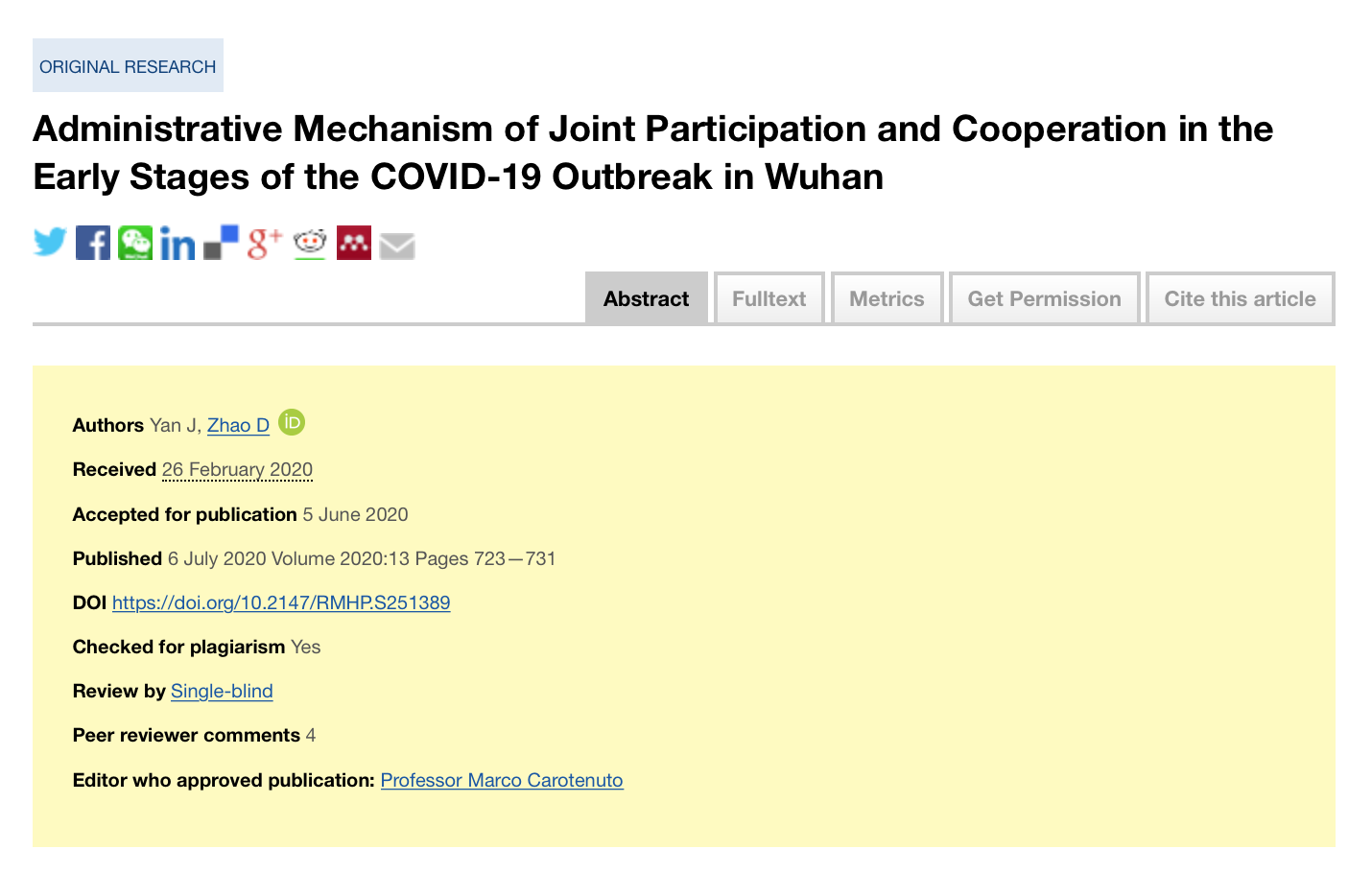Administrative Mechanism of Joint Participation and Cooperation in the Early Stages of the COVID-19 Outbreak in Wuhan

Cite this article: Yan J, Zhao D. Administrative Mechanism of Joint Participation and Cooperation in the Early Stages of the COVID-19 Outbreak in Wuhan. Risk Manag Healthc Policy. 2020;13:723-731
https://doi.org/10.2147/RMHP.S251389
Introduction: From December 2019 to January 2020, a novel coronavirus disease (officially COVID-19) was reported in Wuhan and continued to spread all China. This study describes the administrative mechanism of joint participation and cooperation during the early stages of the COVID-19 outbreak in Wuhan and the rest of the country by health practitioners and administrative authorities.
Methods: This study adopted a qualitative design. An analytical framework based on the theory of policy participation that included stimulus, setting, and position of policy participation was constructed. Qualitative data of policy participation by health practitioners and administrative authorities consisted of publicly available data.
Results: Early during the outbreak, from December 2019 to January 2020, three main stages occurred according to the containment situation. The first stage was characterized by limited knowledge of the transmission dynamics of the virus and a consequently weak response. In the second stage, the disease spreads rapidly because of travel during a national festival. In the third stage, particularly when top Chinese leaders delivered instructions to intensify containment efforts, diverse departments initiated joint prevention and control measures to combat COVID-19.
Conclusion: The administrative mechanism of joint participation and cooperation was instrumental in avoiding a substantial increase in both cases and fatalities in the initial stage of the outbreak. This joint participation provides valuable experience and initiatives for major public health emergency preparedness, and the new empirical evidence further highlights the importance of policy participation theory in epidemic prevention in other countries.
Keywords: joint administration, coronavirus disease 2019, public health emergency, policy participation
以下是参考中文翻译:
研究文章
新冠肺炎疫情在武汉流行早期应对的联防联控机制
引用本文: Yan J, Zhao D. Administrative Mechanism of Joint Participation and Cooperation in the Early Stages of the COVID-19 Outbreak in Wuhan. Risk Manag Healthc Policy. 2020;13:723-731
https://doi.org/10.2147/RMHP.S251389
介绍:2019年12月至2020年1月,武汉发现了新型冠状病毒病流行(官方称COVID-19)。本研究描述了这段时期武汉及全国各地卫生从业人员和行政部门在新冠肺炎疫情早期联合参与、联防联控的管理机制。
方法:本研究采用定性设计。以政策参与理论为基础,构建了政策参与的激励机制、政策参与的设置和政策参与的地位等分析框架。卫生从业人员和行政当局参与政策的定性数据包括可公开获得的数据。
结果:2019年12月至2020年1月疫情流行早期,疫情防控分为三个主要阶段。第一阶段的特点是对病毒传播动力学的了解有限,呈现为弱应对。在第二阶段,由于全国性节日期间的人员流动,疾病迅速流行。在第三阶段,特别是在中国高层领导发出加强联防联控工作的指示后,各部门参与形成联防联控的系列措施,形成了联合抗击新冠肺炎疫情的工作机制。
结论:联防联控机制在避免疫情流行早期病例和死亡人数大幅增加非常奏效。这种行政联合机制为重大公共卫生应急管理积累下了宝贵的实践经验,在抗击疫情方面所呈现的创新举措和证据也凸显了政策参与的理论在预防流行病实践中的重要性。

